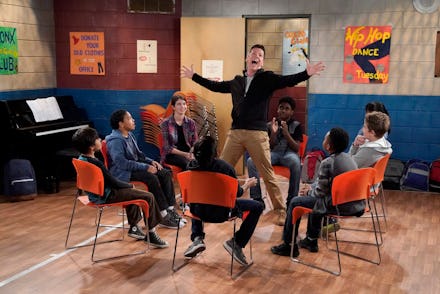In the new ‘Will & Grace,’ Jack McFarland is something we’ve never seen on TV before: an aging twink

It was fair to feel confused when NBC announced it was resurrecting Will & Grace after 11 years off the air. Sure, we’re living through an endless parade of reboots and reunions. Sure, networks have been reduced to celebrating ratings that once would have been an embarrassment. And sure, the comedy Emmys are now dominated by shows with more references to the holocaust and Black Lives Matter than one-liners. Still, it seemed bizarre that one of the last great racehorses of network multi-cam comedy would be coming out of retirement. As a gay man, I wondered how these characters would resonate in a world vastly different from the one that last saw them in 2006. In a world with Maura Pfefferman, is there any place for Jack McFarland?
When Will & Grace debuted in 1998, gay sex was still illegal in 19 states, there wasn’t a country where gay people could get married, and depictions of gay men and women in media were limited and reductive. Then Will, Grace, Karen and Jack bounced into America’s living rooms with new constructions of male homosexuality. Gay men were no longer nefarious villains or tragic plague victims. They were the glib, sassy best friends every woman should want. It was still reductive, but it did the job. In 2012, Vice President Joe Biden pointed to Will & Grace as a key factor in getting a majority of Americans to accept homosexuality.
Will Truman’s role, if nothing else, was to be acceptable. He was played by a straight actor. He might have wicked opinions about pop culture, but his romantic choices were tame and trained toward domesticity. In a world where people were still saying, “I don’t know why they need to rub it in your face,” Will was the gay you could trust never would.
And then there was Jack. A cocktail of every stereotype of gay men that had ever existed, Jack reminded us of Will’s normalcy. To quote Mean Girls, Jack was “too gay too function.” Every time a gay man said, “Yeah, but I’m not one of those gays,” he meant Jack from Will & Grace. If Will was inoffensive because he was never too much, Jack was inoffensive because he was always too much. Many accused the show of gay minstrelsy, and going into the new episodes of Will & Grace, I worried how these identities, primarily designed to be acceptable to heterosexual audiences, would seem 20 years later.
The result is charming. Lots of articles are going to assure you that Will & Grace is peddling outdated constructions of queer identity, and if you’re a straight person, you might be tempted to believe them. It’s an easy take, but it’s wrong. As it has always done, Will & Grace is helping America build new constructions of gay identity.
Jack McFarland in 2017 is a thing we haven’t really seen on television before: an aging twink. Sean Hayes was a lithe, adorable, theatrical 27-year-old when Will & Grace started production. Making him a shallow, slutty, dramatic no-talent actor just fed the same cliché we’d seen from store clerks and bitchy male secretaries in TV and movies. Now he’s almost 50, still talking about how nothing’s more important than youth and sex appeal, and the result is incisive and heart warming. In the 11 years it has been gone, Will & Grace has aged into a show about old queens trying to figure out where they fit in gay culture.
In the second episode of the new season, Will dates a 23-year-old while Jack uses some of Karen’s tricks to hide his wrinkles and paunch. Jack has to figure out how he fits into gay nightlife, a narrative that could be presented as chilling, but through tight writing and Hayes’ physical comedy, becomes safer and a whole lot more fun.
In 1998, when Will & Grace came out, there were barely any gay 50-year-old men, period. A generation of men had been killed by AIDS in the ’80s, and young gay men didn’t have many role models for what our lives should look like after 30. Jack may have been a bundle of clichés in 1998, but now he’s pioneering new territory, and it’s delightfully necessary.
Some gays will say that there are new, cooler, subtler gay identities that Will & Grace doesn’t understand. Those people probably enjoyed the unbearably boring, stuffy and self-conscious Looking on HBO, full of characters who never squealed or dropped a funny one-liner. What these very modern homosexuals fail to understand is that 10 years from now, their homosexuality will be outdated too, and they’ll be struggling to figure out where they fit. It may be easy to dismiss Jack and the rest of the bunch from Will & Grace as anachronisms in a new sexual world. The truth is they’re dinosaurs surviving the crunch, and I’ll drink to that.
September 29, 2017, 8:47 p.m.: This article has been updated.